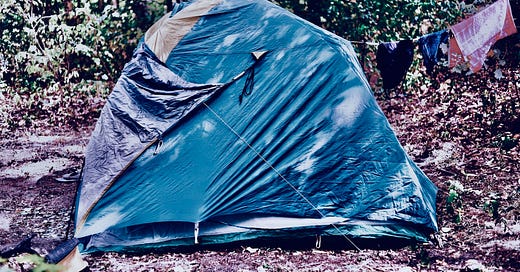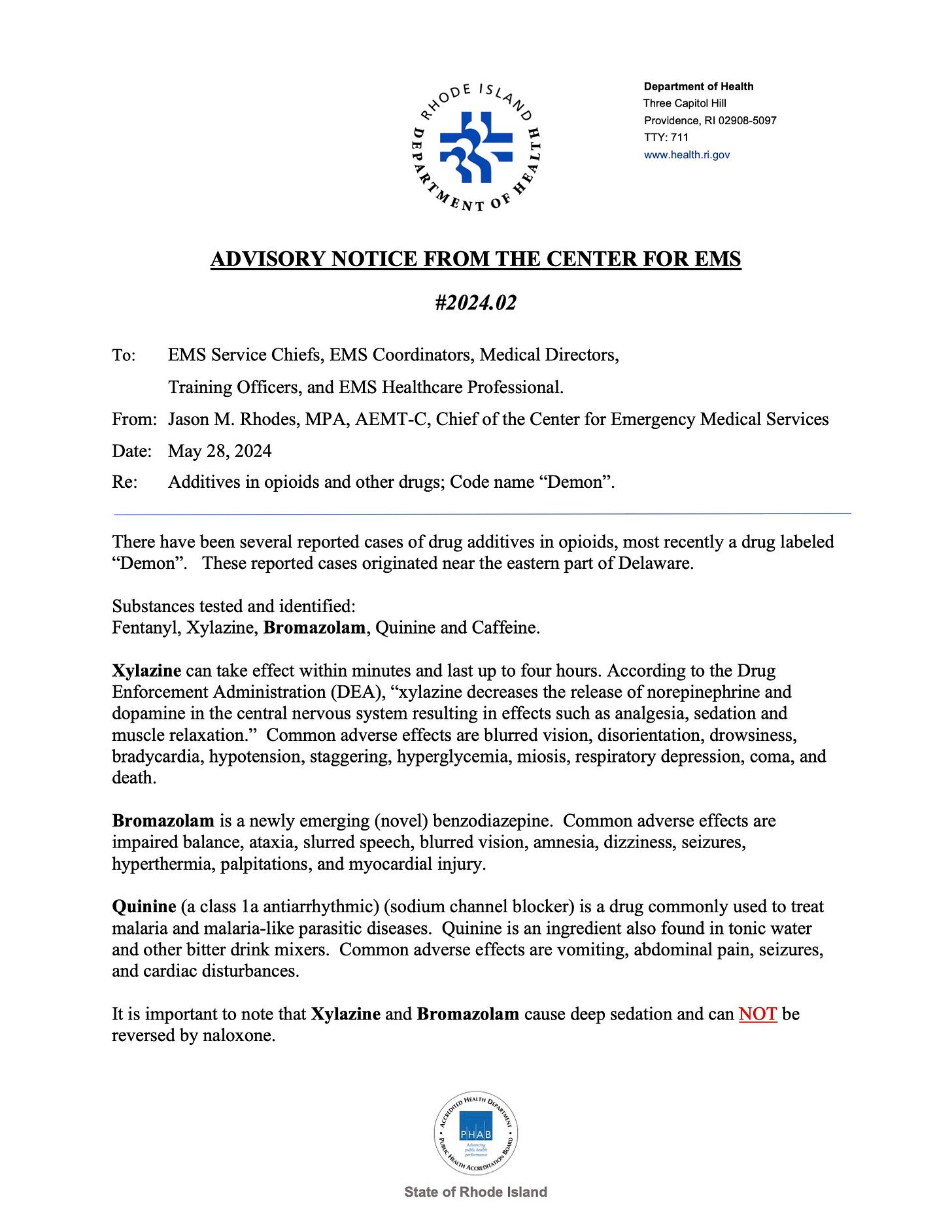Dispersed encampments and a new street drug are killing people in Providence
"It's a perfect storm," said outreach worker Amy Santiago. "And we still have folks that we can't locate since the breakup of the encampments."
It's been over a month since Providence Mayor Brett Smiley forcibly evicted unhoused Providence residents from two tent encampments in the city. Since then, life has rapidly deteriorated for most of the people affected. I arranged to meet Better Lives Rhode Island outreach worker Amy Santiago and talk to some affected people. What I experienced and witnessed that day was nightmarish. For Amy, it was just another day at work.
[See: Oped: Mayor Smiley's War on the Poor, Providence Mayor Brett Smiley is evicting up to 85 people experiencing homelessness from three encampments, and Providence Mayor Smiley takes questions on unhoused encampment evictions]
For this story, I have obscured some details and changed the names of people experiencing homelessness. Many of the people I spoke to feel, rightly or not, that officers of the Providence Police Department are actively hunting them. The harassment they experience is unrelenting.
Amy wanted to meet near the corner of Niantic Avenue and Cranston Street. I parked the car and saw her speaking to one of her clients, a man seated in a folding chair by the red light, panhandling. I couldn't tell at the time, but the man was in medical distress. As I crossed the street, I noticed that a minivan was paused at the intersection, and to my shock, the driver was unconscious, his head back, mouth open, and his arms listlessly by his sides.
I called 911 and banged on the car window. The man was not responsive. His driver-side window being down, I stepped into traffic as cars continued to awkwardly make their way around the car, and shouted at the man to wake up if he could hear me. No response. The car was running. And though I couldn't tell if the man was breathing, I could see evidence of a pulse in his neck.
Another man came up to the car and reached through the window to gently slap the man's face. No response. He also turned the car off. Checking for a pulse at the man's wrist, he told me it was there, but faint. It took a long time for the police to arrive, and longer for a rescue vehicle. I stood away from the vehicle, giving the officers the room they needed to assist the man.
“I think he's dead,” said a woman.
“If he's not, he's close to it,” I replied.
As the police checked on the man, he suddenly jolted awake. [In retrospect it's possible that one of the officers administered Narcan, which can reverse the effects of an opioid overdose.] The man was confused, and the officers were assisting him. But as I turned to cross the street and meet with Amy, suddenly the man lunged at the officers, and it took four of them to restrain and cuff him.
Eventually, the man was taken away in a rescue vehicle to an emergency room.
I crossed the street to talk to Amy. Two paramedics were there, assisting the man seated in the folding chair. The man had large black abscesses on his left leg. The paramedics were telling him that if he did not get to a hospital and have his leg tended to, he would lose the leg, and possibly die.
As the paramedics negotiated with the man about getting him into the hospital, I spoke to Amy about what I was seeing here.
Amy Santiago: They can’t handle Demon. I got to tell you, when folks found out that it was running rampant on Cranston Street, rather than running away from it, my clients from the other side of town said, “Drop me on Cranston Street. Can you drop me off on Cranston Street?”
Steve Ahlquist: What is Demon, exactly?1
Amy Santiago: Fentanyl has been mixed with Xylazine for over a year and people have built up a tolerance to it. They're having this horrible reaction - their wounds are necrotic, a terrible side effect. If that wasn't bad enough, they've started to mix the Fentanyl with Xylazine and Benzo. And the problem with the Benzo is it's stopping people's hearts. It slows your heart rate down so much that the Narcan isn't working. You have to start CPR right away.
Steve Ahlquist: That's what one of the cops was doing across the street, for the unconscious man. He was rubbing the man's chest hard while he was still in his car.
Amy Santiago: Right now there are no more large encampments, right? There are many, smaller encampments, but no large encampments, so you can't call anyone for help. You can't call to your neighbor. You're alone in the woods. You're lucky if you have a partner with you. One of my clients told me yesterday that Narcan didn't work on her. Her boyfriend is ex-military - he did eight years of service and he knows how to do CPR. He had to do CPR on her for over eight minutes.
Steve Ahlquist: These are otherwise younger, healthier people...
Amy Santiago: People who under normal circumstances would be fine. She's in her early thirties. And it's difficult to say this, but many of our clients are very good at doing first Heroin, then Fentanyl, and then Fentanyl with Xylazine. They know how to handle themselves. But this new drug, they're not handling it very well. So we are doing CPR a lot more. The EMS professionals in Providence and Cranston are doing CPR a lot more. Our clients who know how to do CPR are doing it. All our clients know how to use Narcan, but now we need to teach them CPR.
Steve Ahlquist: Because with this new Benzo additive, Narcan is just not hitting.
Amy Santiago: No, it's not hitting.
Steve Ahlquist: You told me a story the other day - and I want to get this story down in an accurate way - about a couple living in the woods somewhere, and they're afraid to tell you where they are.
Amy Santiago: They're afraid to tell me where they are because as outreach professionals, we are a big red flag for the police. Police know our cars, they know what we look like, and they've followed us in the past. I'm not saying it's nefarious.
Steve Ahlquist: Maybe they're just looking out for you.
Amy Santiago: They may be looking out for us, but the police believe that our clients are a good source of information about the drug trade in Providence. We don't see this in Pawtucket so much. We never see it in North Providence. Some of our clients believe that wherever we go, eventually the police will show up.
Some of our clients have warrants - not for anything big - it might be a bench warrant or what have you. But because some of our clients use Fentanyl, and they're using this new Fentanyl known as Demon, they're afraid that the police will follow us to them, so they don't want us to know where they are.
Steve Ahlquist: So you have to arrange to meet these clients near their encampments, close to where they are staying.
Amy Santiago: We're bringing food, supplies, and Narcan, but the Narcan is little help now.
So this one woman, as I was meeting her at a location near her encampment, her boyfriend OD'ed. I heard her screaming and I had to go find her encampment to go help.
Steve Ahlquist: You don't know where she is. You're just following her screams and making your way through the woods.
Amy Santiago: Right. I'm following her screams. I get to them and he's gone. I used seven Narcans before realizing, I needed to do chest compressions and rescue breathing.
Steve Ahlquist: Because it's still early on in Demon days.
Amy Santiago: Yes. He's fine - I mean, as fine as he's going to be. And this is someone who refused to allow me to call an ambulance.
Steve Ahlquist: Even with Narcan, without a follow-up to an emergency room, you can relapse very quickly.
Amy Santiago: Folks might challenge me on that decision but when folks run deeper into the woods or don't trust me I can't help them eat all. We have to make the decision. We follow them around, make sure they're okay, and then we have to break their trust? Ultimately, if we think they're going down again, we have to make a decision. Are you qualified to stay with them and watch them for a while? If you do you've given up the rest of your afternoon.
Steve Ahlquist: It's like being a priest. You can't break the confessional until a certain point and then you have to make a difficult decision.
Steve Ahlquist: Since Mayor Smiley broke up the bigger encampments, we've got people scattered all over.
Amy Santiago: All over.
Steve Ahlquist: I contacted you because I've heard that people have died. Can you talk about that a little bit?
Amy Santiago: There was an encampment in Providence where we had a young woman die. This was an encampment that hadn't been broken up yet, but everyone from that encampment scattered following her death.
They feared that the Providence Police would come in and ask a lot of questions. Some of them have warrants and even those folks that didn't have warrants didn't want the aftermath. And her death was traumatic for them. She was a friend of theirs.
Steve Ahlquist: I've heard that at least three people have died since the encampments were dispersed.
Amy Santiago: Yes. There have been 36 overdoses reported to EMS. We've heard two or three deaths were officially reported. We're concerned that some of the other bodies that have been found may be overdose deaths and would like to see the autopsies on those, but we know of two for sure and possibly three. And that's just in the city of Providence. We didn't check Cranston, Pawtucket, or any of the other cities. For all of the ones that have been reported, we know that we've done CPR and rescue breathing for a number that haven't been reported.
Steve Ahlquist: Because when people are in smaller encampments they are not able to look out for each other. And this new form of lethal Fentanyl is just adding to it. To be clear, this was the predicted outcome of Mayor Smiley's policy decisions.
Amy Santiago: It's a perfect storm. And we still have folks that we can't locate since the breakup of the encampments.
Steve Ahlquist: You have no idea where they went?
Amy Santiago: No.
Steve Ahlquist: So for all we know there's a tent out in the woods somewhere with bodies inside.
Amy Santiago: We don't know. We're running around trying to find the people that we lost track of.
Steve Ahlquist: Can a connection be made between someone dying unsheltered and the raid on the encampments?
Amy Santiago: We know that the young woman who died had previously lived in both encampments. She moved before the complete annihilation of the encampments. We were telling people this was coming down the pike before we had definite notice, so people started moving because they were nervous about interactions with the police.
Steve Ahlquist: What else should I know about this?
Amy Santiago: We're grateful to the folks we serve because they tell us things. We've gotten reports from our folks that the drug we're looking for is pinkish-purple so we can warn people.
Amy and I drove to meet with Sarah and Frank, a married couple who live separately, but near each other, apart from anyone else. Sarah and Frank both use drugs. Note that none of the advice about drugs in this interview should be taken as fact.
Steve Ahlquist: What has changed between being in the encampment with a lot of people and now being in a camping spot with maybe one or two people?
Sarah: Where I am now is not the best spot I've ever had. I've made a house underground.
Steve Ahlquist: You put a lot of work into these locations. Do you find being alone to be dangerous?
Sarah: I did until I got a dog.
Steve Ahlquist: That makes things different.
Sarah: Before, I would never set up a tent by myself left in the woods.
Steve Ahlquist: Right.
Sarah: I've slept in crazy places - tucked up underneath the truck in front of a 7-11, but I would never tuck myself into the woods by myself. Now that I have a dog - I mean - he's not going to let anybody hurt me.
Steve Ahlquist: No. He's going to defend you.
Sarah: But yes, being alone is very scary. Walking around at night alone is very scary. I almost got kidnapped once. It was horrifying.
Steve Ahlquist: I'm so sorry.
Sarah: They wanted to turn me into a sex leave. It was the worst thing that's ever happened to me.
Steve Ahlquist: That's awful.
Sarah: It was really scary.
Steve Ahlquist: I'm sorry. What I'm trying to get at is if things are worse now that all these encampments have been dispersed.
Sarah: Yes.
Steve Ahlquist: In what way?
Sarah: I can't find anybody I know. Most people don't have spots and they are moving from spot to spot to spot because every time they set up somewhere, they're getting kicked out...
Steve Ahlquist: That's the police coming by telling people they can't camp.
Sarah: Plus, they took all of our names when they kicked us out of the encampment and said, “Don't worry, we're just taking your name and date of birth so that we know that we served you with an eviction. We're not going to run anybody's names, first name basis stuff.” But then a week later they went around and arrested everybody who had a bench warrant
Steve Ahlquist: Of course they did.
Have you known of anybody who's been hurt since this happened?
Sarah: I don't know where most people are. Some people set up nearby but got kicked out right away.
Steve Ahlquist: So people have to figure out where they have to sleep every day. They have to figure out a new place every night.
Sarah: That happened to me for the first three months I was homeless and it's awful. I had to be dope sick. I lost like 30 pounds I couldn't afford to lose.
Steve Ahlquist: You don't have a lot of weight to lose.
Sarah: I mean, I understand why they don't want big encampments, but at the same time those big encampments do provide more safety for people.
Frank: They want a toilet and trash pick up. The majority of people would pick it up if they had a place to put it.
Sarah: Most of the people that lived in those encampments were respectful and good. We kicked out all the people that sucked, as a group. It was a decent place.
Frank: One of the biggest things is a shower.
Sarah: A lot of us have jobs.
Frank: I know they have Shower to Empower, but that's only twice a week.
Sarah: You can't go to work like this. I feel bad. I know a lot of people that were working, they were stable. It's hard when you're running the streets.
Frank: It's crime, homelessness, jail, crime, homelessness, jail, over and over again. You can't get out of the loop.
Steve Ahlquist: And the crimes we're talking about are survival crimes, right?
Sarah: I have arrest warrants for stealing ice cream.
Frank: That's our first addiction.
Steve Ahlquist: Can you tell me about this purple Fentanol?
Sarah: There are two different purples out there.
Amy Santiago: Can you explain that to me?
Sarah: If it starts white with a purple tint and then gets purple when you mix it, that shit's fine.
The shit that's already purple when you get it as a powder is the bad shit.
Amy Santiago: The one that is purple to start with. It's not just Xylazine, it's Benzo.
Frank: It's not even Fentanyl, just Benzo probably.
Sarah: I tell everybody, if it gives you that warm flush rush that you are loving, that you've never had before in your five years of doing Fentanyl, obviously it's not motherfucking Fentanyl, it's Benzo and that's a separate addiction with different effects and withdrawal. When that shit disappears people are going to be seizing out because Benzo cause seizures.
Then what am I going to do? Start drinking or doing Benzos so I don't have a seizure? These other people don't realize that they're going to be having seizures all over town.
Amy Santiago: I didn't think of that.
Frank: And then there are the wounds and abscesses. They don't happen at the injection spot, they just pop up wherever they want.
Sarah: That's why Frank ended up with me because he had an abscess that was so bad he had blood poisoning. What was I going to do? Tell him to go keep running the streets or come back to my spot?







After I went to press I learned that a small encampment was evicted this morning with three hours notice.
The most recent sample we tested at VICTA had no detectable fentanyl, all benzo and xylazine, possibly medetomidine but the library hasn’t mapped that yet. We can’t keep up. It’s infuriating and heartbreaking and exhausting.
PLEASE don’t use alone. Start low, go slow.
Neverusealone.com